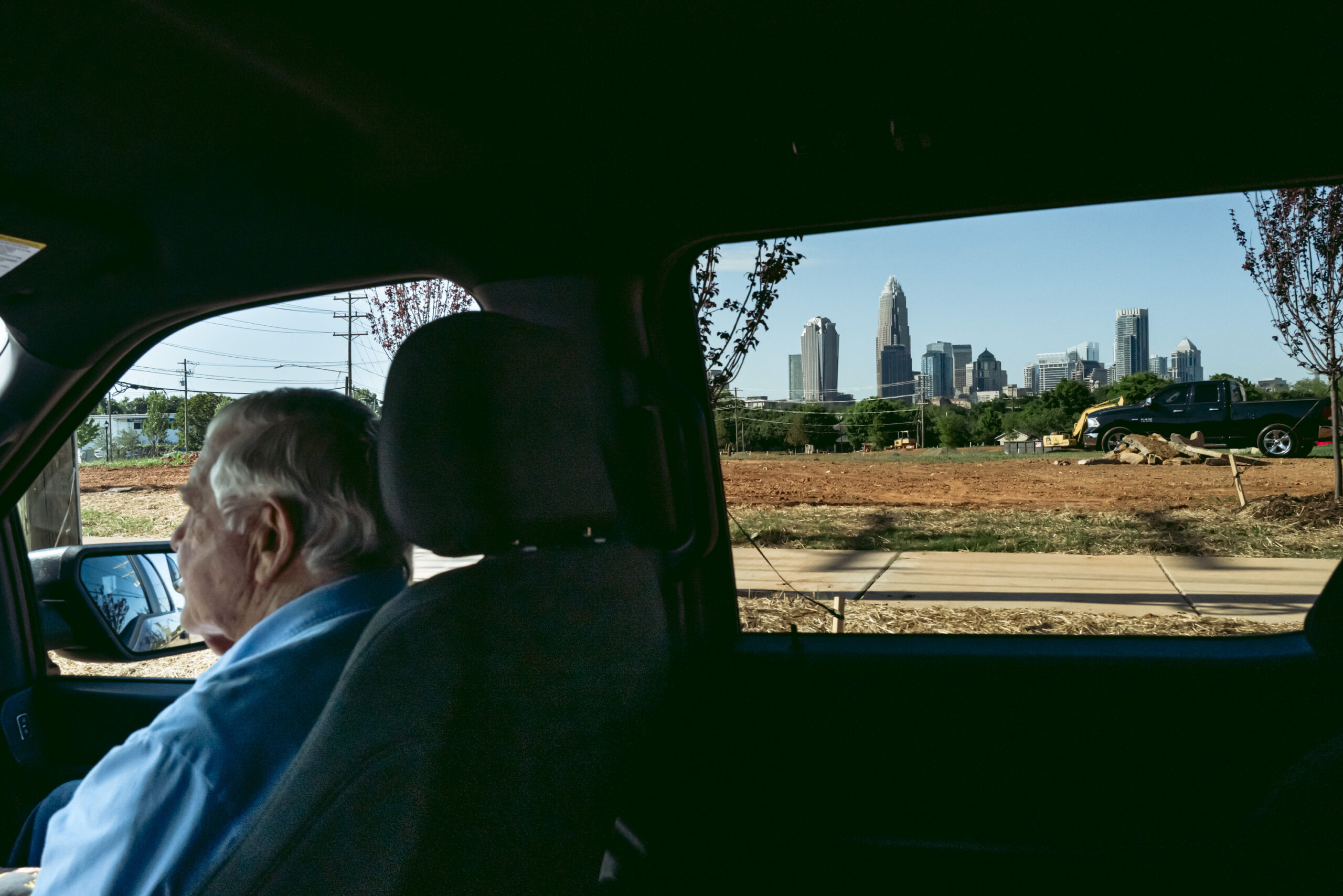The oak trees are gone.
We’re riding down a street he once traveled every day, looking for the home where his kids took their first steps. But the trouble with growing old is you might outlive the shade trees in the front yard.
“I don’t know where the hell I am,” Hugh McColl says on a late April morning. He’s in the passenger’s seat of my truck, and we’ve driven all around Charlotte, time traveling.
Now we’re pulling into Beverly Woods, the neighborhood where he lived in the 1960s, where brick ranches and split-levels still stretch like crops in a rolling summer field.
“I mean, I know where I am but I don’t really know it,” he says. “You gotta remember it’s been 55 years since I lived here.”

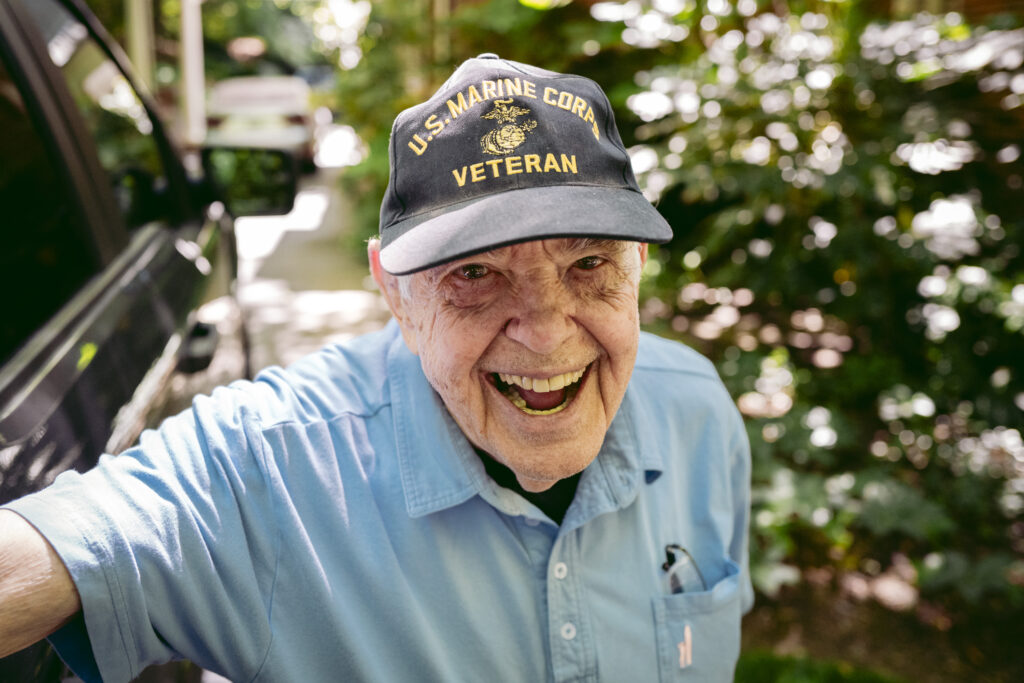
McColl’s 90th birthday is this week, on Wednesday, June 18. Charlotte will celebrate by opening McColl Park at the city’s chief intersection, Trade and Tryon, across the street from the Bank of America headquarters tower he built. At 879 feet, the tower is the tallest building between Philadelphia and Atlanta, and would be the tallest building in all but about a half-dozen states. McColl is 5-foot-6. Funny how that happens.
During our ride around the city, he nibbles at the topic of death, brings it up in bursts and often as a joke, but says he doesn’t spend much time worrying about it. He’s always said he’ll live to be 100, and he tends to do what he sets out to do. He’s cut back on driving, only going about four places on his own. He’s got more bruises than he’d like — in April he skipped his annual trip to the Masters because he’d fallen and busted his lip, and he didn’t feel like answering questions about it for four days.
But he’s still sharp, maybe sharper than ever in some ways. He says he wants Charlotte to stay focused on its larger goals — things like housing, education, transportation, economic mobility — even as, and maybe especially as, the national political climate becomes … whatever it’s becoming. He still shows flashes of the fiery personality he used to gobble up banks all across the country in the 1980s and 1990s, as he turned North Carolina National Bank into Bank of America, spinning the financial world on his fingertip.
“Damn idiot,” he says when a driver cuts us off on Park Road.
He’s still running businesses. Earlier this year the private equity firm he co-founded made, as he casually puts it, “more than a billion dollars” by selling the company that owns Duke’s Mayonnaise.
“What I do know is that the way to die is to do nothing,” he says, “and the way to live is to keep doing.”
Time and perspective are among his greatest treasures now, though. And the beauty of being 90, says this man who once dined with presidents, is that it’s helped him realize “how unimportant we really are, and how important we think we are at different points in our lives. But we aren’t really very important. … Living a long time makes you appreciate the little things about the world more.”
Little things?
“Just the sunshine today. The temperature. Just the trees.”
Trees, like the ones that were here on a lot in Beverly Woods, and now are not.

Hugh and his wife, Jane, built one of the first homes in the neighborhood in 1961, a three-bedroom, two-bath ranch on Severn Avenue, using old bricks salvaged from a demolished building in South Carolina.
From here, they set the foundation for their family and his legendary banking career, which would end 40 years later as CEO and chairman of Bank of America. When they moved in, he’d just been promoted to assistant vice president at NCNB. He was a young U.S. Marine Corps veteran with a business degree, a sociologist’s awareness, and a fondness for the leadership style of football coaching legend Vince Lombardi.
His biggest motivator was Jane. They’d met in 1959 on a post-college trip to Europe. He took her to see “My Fair Lady” in London and doesn’t remember a thing about the show, but he remembers he proposed to her by the end of the trip. They moved to Charlotte three months later, rented a room in Dilworth, and got married one month after that. They moved into an apartment on Selwyn for a couple of years, had their oldest son, and now they were growing their family and needed a home.
Yes, the path of the arguably most important citizen in modern Charlotte began in just about the most ordinary Charlotte way: Young banker in love moves out of an apartment to raise a family.
He can remember he paid $24,500 to build the house, including $600 for the special bricks. But he’s having a hard time finding it.
“Go on down here a minute and we’ll turn around and go back,” he says, and so we do. Retracing our tracks, we come upon a four-way stop. He notices a one-story brick ranch on a hill on a corner to our left, and the grandfather clock in his singular mind chimes.
“That’s it. That’s my house right there,” he says. “The reason I didn’t recognize it is the trees are all gone. There were two big oak trees there.”
Then, for a brief moment this man who built a career and a city on the idea of looking forward starts to unroll the images of his young family again, flickering like an old reel.
“The children played in the front yard,” he says. They had two boys, then a girl. “When Jane was born, the baby, we realized we were all over ourselves.”
He chuckles. Then, after about a minute, he says, “Let’s go straight,” and we drive on.

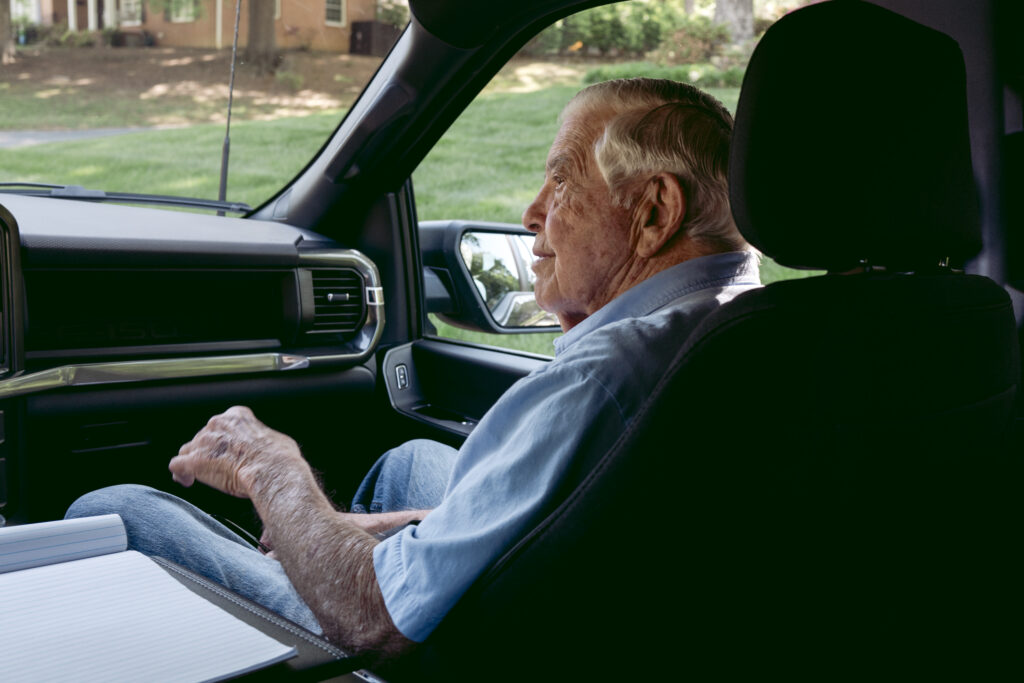
In summer 2018, I was eating lunch with McColl in his favorite window booth at 300 East in Dilworth, and he said, “I consider you a friend.”
It caught me by surprise. I’d interviewed him a couple of times and we’d both been part of a community organization aimed to build trust across differences, but I was just a writer who knew as much about business as I did brain surgery. Hugh saw something else.
I’m hardly alone. McColl’s developed countless relationships with “young people” in recent years — and by young he seems to mean anybody younger than his own children, now in their late 50s and 60s — because they “keep you energetic.”
I love the man, not for his money (we still split lunch bills) but his humor and wisdom, and because every time I talk to him I understand Charlotte a little better, life a little better.
I have two kids now, 5 and 2, and spend a good deal of time wondering whether I’m giving my days to things I’ll remember when my own clock winds down.
“Are you 50 yet?” Hugh asks me during our rideabout.
“45,” I say.
“Alright you’re halfway there,” he says.

He thought he was halfway there at 35, and he remembers the panic it caused him.
“I was flying to Texas on an airplane, and I remember it clear as a bell,” he says. “I remember thinking, ‘I’ve lived half my life and I haven’t done anything. I need to accelerate harder.’”
He accelerated, alright. He became president of NCNB by 38, chairman and CEO by 48, in 1983. He developed a reputation as a sort of honey badger in a suit. “He doesn’t know any way to go except 150 percent,” a peer once told The New York Times. “He doesn’t know what the word ‘quit’ is.” That Times story says that during the recession in the 1980s, McColl sent 250 of NCNB’s top bankers to Texas and strategically stationed them in hotels near First Republicbank locations, to secure a deal to purchase the struggling bank. It worked.
By then he knew that creating a vibrant city was key to hiring and recruiting talent, so he built one. A whole city. He had the help of mayor Harvey Gantt, who became Charlotte’s first Black mayor the same year McColl became CEO. McColl and the bank invested billions in center city, he says, financing housing to revitalize Fourth Ward, then the NFL stadium and the transportation center. He helped lead philanthropic campaigns for cultural institutions like the symphony and ballet.
It’s hard to fathom such speed today, given the bureaucracy and political handwringing around even local government.
“I don’t think you really understand anything about that,” he says when I ask him how he built consensus among local elected officials at the time. “We just did what we wanted to do. We didn’t present anything.”
The 1990s, from the ages of 55 to 65, were his crowning years in business. What’s now BofA tower was finished in 1992, just after NCNB became NationsBank. That year he formed a relationship with a presidential candidate from Arkansas named Bill Clinton and flew to meet him at a hotel in rural Georgia during the campaign. Clinton ordered a bucket of fried chicken and ate the whole thing while listening to McColl’s pitch for why the federal government should change its interstate banking laws to allow banks to go national. They talked so late that when McColl went back to the airport, he had to scale a fence and wake up the pilot to fly home.
Two years later, Congress passed and Clinton signed a law allowing banks to open branches across state lines. Six years later, NationsBank became Bank of America, headquartered in Charlotte, with McColl as CEO.
It was, without question, the most successful run of his career. But in terms of life?
“I remember very little about the ’90s,” he says. “And yet that’s when I accomplished more.”
When we dig into that, it’s clear that his enduring internal conflict had nothing to do with the competitions with other banks, or the stresses of regulations: It’s that he believes working hard is the key to longevity, but working too hard is detrimental to remembering any of it. As he told the Observer recently, “I wish I’d spent more time with my family.”
McColl retired from the bank in 2001, and tried to find the sweet spot between the two.
“What I wanted out of life was to not ever have to do anything again, but also not have nothing to do,” he says of retirement. “I’ve been trying to find that balance now for 25 years.”
He’s launched a half-dozen businesses since then. He started with an art gallery on East Boulevard, and “spent the next decade losing money on that.” (He also jokes that he’s no good at residential real estate: “If you see me buying real estate it’s time to sell.”)
But the private equity firm Falfurrias Capital Partners, which he co-founded, has been terrifically successful.
Consider the mayo. Falfurrias bought Sauer Brands in 2019 for an estimated $300 million and — countless brand campaigns and several Duke’s Mayo Bowls later — sold it earlier this year for $1.5 billion, according to reports.
Sauer has many products, but “what really sold it was the mayonnaise,” he says.
This leads me to the most natural next question.
“Are you a Duke’s eater?”
“No,” he said. “I don’t like mayonnaise, period. I like Durkee’s. Do you know Durkee’s?”
I don’t, I tell him.
“You could argue it’s a mix of mustard and mayonnaise. … It’s been around since I was a child. That’s when I learned to like it. You should try it. It’s very tasty.”
If you really want to honor Hugh McColl on his birthday, find yourself a good shade tree and a sandwich with some Durkee’s sauce.

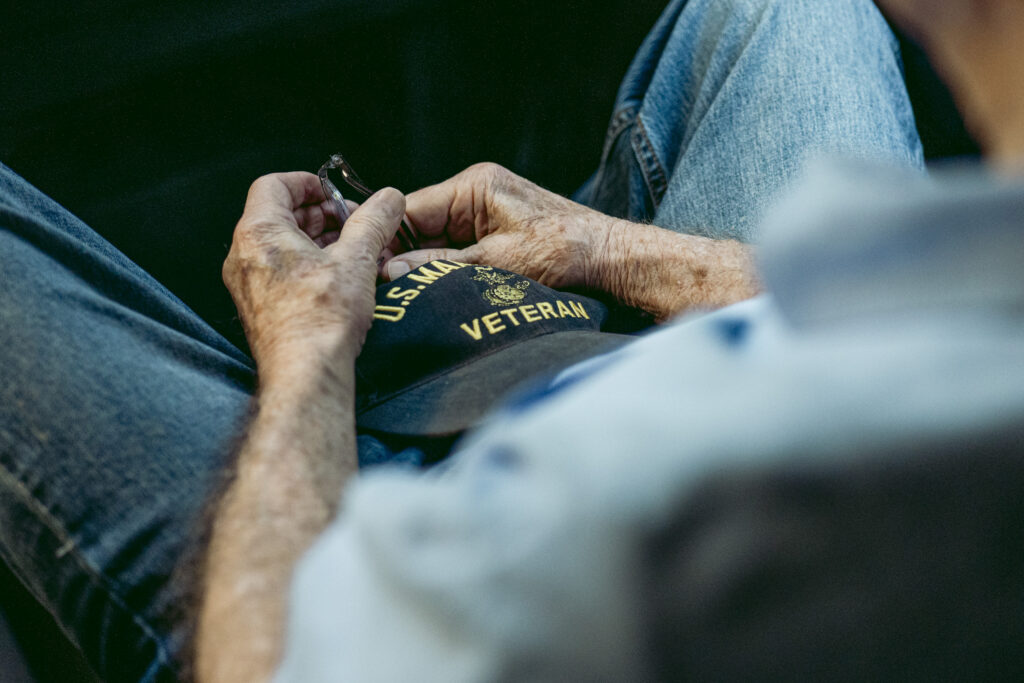
He can’t stop turning his head toward the skyline.
He’s amused by the big sign debate. How Truist had its name on its tower, and how Wells Fargo is doing the same. It reminds him of how a contractor in the 1960s or ‘70s told him that putting your branding on your skyscraper would be “like putting a sign on Raquel Welch that says ‘girl.’” He sees the Wells Fargo decision literally as a sign of the changing times, in more ways than one.
He’s more interested in neighborhood-level work these days, anyhow. The 2014 report that ranked Charlotte last among major cities in economic mobility shook him, and caused him to examine how the prosperity he helped create here left so many residents behind.
Over the past decade, McColl’s publicly committed to investing in Black-owned businesses, to try to get their ideas off the ground. In 2020, he joined two Black businessmen — retiring EY executive Malcomb Coley and former Duke Energy NC president Lloyd Yates — to found Bright Hope Capital, a firm investing in Black and Hispanic-owned businesses.
On this topic, he does still worry about the city. And the country. He’s a Marine Corps veteran, and that “Once a Marine, Always a Marine” slogan is real. One of the most lasting lessons that came out of his service, he’s always said, was one on race.
He’d grown up in the segregated South, in Bennettsville, S.C., and took it as a plain fact that the Black sharecroppers just lived with less than his family did. “I was the worst kind of racist in that I didn’t even notice it,” he told me once.
During a training exercise in Korea, at Red Beach, he was the officer who jumped first into the water. He lost his form on the way down, and the air tank on his back hit him in the head, as he recounted in an interview with our mutual friend Dae-Lee Arrington.
From above, a sergeant saw McColl’s blood pooling, saw that McColl was knocked out. So the sergeant jumped as quickly as he could and saved McColl’s life. That sergeant was a Black man.
McColl never forgot that. His service shaped his core view of management — that discrimination is not just a moral issue, but bad for business. He figured that the more inclusive his bank, for women and people of different races, the stronger it would be. He installed hiring practices at NCNB to ensure Black candidates received fair opportunities at advancement.
The other day I listened to a speech he gave at the National Urban League conference in 1993. It was hard not to press it against the window of modern America.
“To be a true meritocracy, we must understand how to manage a diverse workforce. That means the opposite of being ‘race blind’ or ‘color neutral.’ It means looking at our differences and the strengths that these differences represent in the business arena,” he said. “Those differences translate to skills, perspectives and alternative ways of thinking that can distinguish us from our competitors. And if there’s one thing that unites us at NationsBank, it’s beating our competitors.”
He didn’t stumble as he described NationsBank’s corporate diversity effort, and how it’s designed to root out “ingrained barriers” to advancement.
“We must not simply tolerate others and their differences,” he said. “We must appreciate.”
He got a standing ovation.
Maybe the most striking thing about his words, through the lens of 2025, is how unafraid he was to even say them. Thirty-two years later, organizations both for- and nonprofit are scrambling to release foggy, workshopped corporate statements around diversity and inclusion. Some are renaming those programs, others are restructuring, and others are all-out abandoning them, for fear of retribution from the federal government or public scrutiny.
To him these are all steps backward. And if Hugh McColl hates anything, it’s going backward.
“I believe nothing, almost nothing, that I believed when I was in my 20s. I believe very little of what I believed when I was in my 40s. It’s interesting. So you change because you become more informed about the world,” he says.
“I’m able to look back over eight decades, and I’ve experienced a lot of the stuff people write about. … I grew up in a segregated society, a racist society, a provincial society. I just didn’t realize how provincial it was until I lived a long time and traveled a lot and met a lot of people. What you really find is, everyone is provincial. Texans are provincial. People from California are provincial. New Yorkers are provincial. Everybody thinks they’re the center of the universe.”

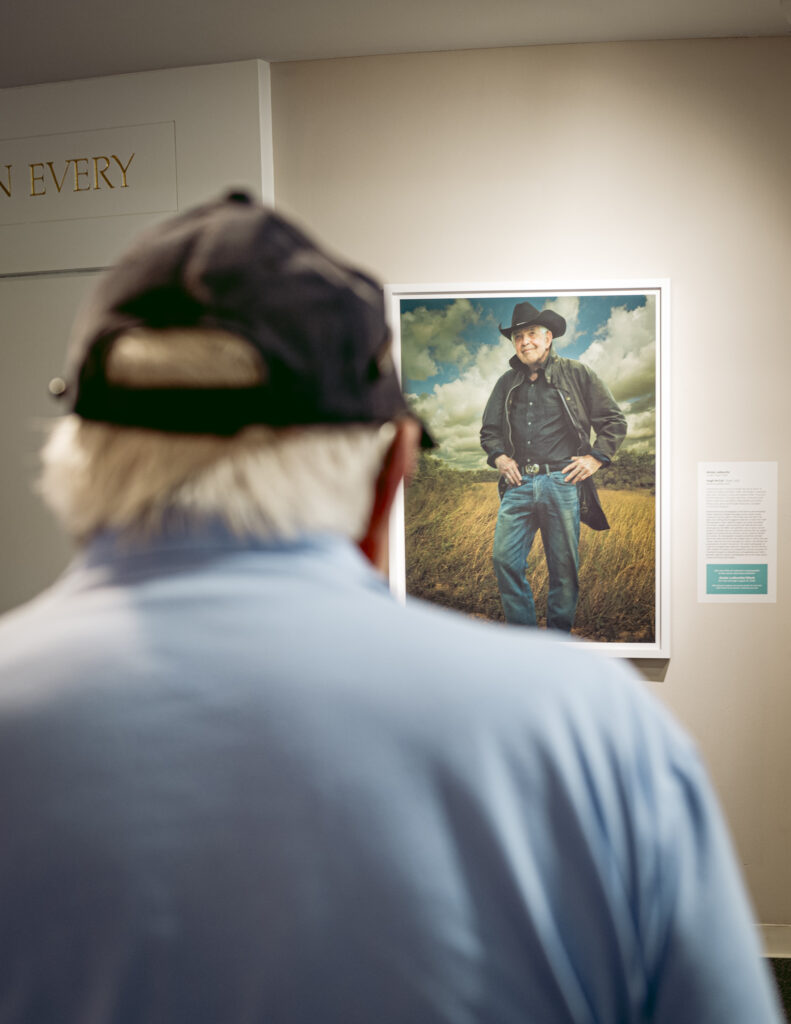
That’s one reason the big 90th birthday celebration is a little uncomfortable for him — the longer he lives, the less he believes he’s deserving of the spotlight. “A lot of people live to be 90 now,” he says.
But like most big birthday bashes, it’s as much about those who want to celebrate him as it is him. And there are many. It’ll begin on Wednesday, his birthday, with a private celebration. Then on Saturday, June 21, there will be a public opening of the new McColl Park from noon to 4 p.m. A few blocks away at the Mint Museum, there’s a new portrait of him, commissioned by his friends, taken by the famed photographer Annie Leibovitz.
She shot the portrait in mid-April on his ranch in Texas. They spent the better part of two days together, driving around while she snapped photos of the landscape. Then they picked a spot for him. In the image, he’s wearing a 50-year-old Barbour jacket he’d purchased in “either London or Scotland.”
Here’s something you might not know about Hugh McColl: He has a pretty good fashion sense. Or, at least, he has a pretty good sense of how appearances shape perceptions. He wore a suit for much of his banking life, when he wanted to be seen. But traveling on planes, he’d wear all black, in hopes that people wouldn’t recognize him.
On Saturdays in Charlotte he’d dress completely down, jeans and t-shirts, so that he could go to his kids’ and grandkids’ little league games at Randolph Park without being noticed or treated differently. People would come up to him and ask, “Anybody ever tell you, you look like Hugh McColl?”
For all the stories about the hand grenade he kept on his desk, or how he’d disarm powerful New Yorkers with his Southern accent and then take their money, McColl’s gift is that he can be one of the most successful businessmen of all time … and just a guy from Charlotte.
It became a mold for future generations. Stories of his generosity weave through coffee conversations around town every day, even when he’s not present. Here’s one that came up during my recent lunch with his former neighbor Joan Zimmerman, a Charlotte treasure who built the consumer and trade show enterprise Southern Shows Inc.
Years ago Zimmerman went to McColl for money to start a Charlotte Women’s Political Caucus. She launched into a big pitch, before he stopped her: “What’s it for? How much? When do you need it?”
“That’s Hugh,” Zimmerman said. “He just believes in people.”
People like Myles McGregor, a Gen Z entrepreneur who became McColl’s driver, and whom McColl helped launch a luxury driving business. Or James Scruggs, a developer who started an affordable-housing nonprofit, with McColl as a board member. Or UNC Charlotte and its chancellor Sharon Gaber, who convinced McColl to join the Board of Trustees when he was 88 years old. (“She’s very persuasive,” he laughs.)
Or Jermaine and Damian Johnson, founders of the thriving chain of No Grease barber shops. Some years ago a mutual friend connected the brothers with McColl. McColl started their conversation with the same question: “What exactly do you need?”
The brothers had taken out a loan of about $300,000 several years earlier. The interest rate on it was 14%. McColl made a phone call, and within 24 hours their interest rate was down to between 3% and 4%. It transformed their business, and now No Grease has 13 locations in four states. The brothers still keep a copy of a 2021 Howard Covington book about McColl, “Beyond the Bank,” at their SouthPark location.
An even bigger one: In the early 1990s, the forthcoming Atlanta Olympic Games couldn’t get a sponsor. Somewhere around 10 companies turned down the opportunity. It could’ve been a massive scar on the games. Then Hugh McColl went to Georgia and asked organizer Billy Payne how much it would cost. Payne told him $40 million.
“That’s all?” McColl said, according to news stories from the time. “Sign me up.”
Something I think about now: Charlotte could’ve come of age at a different point in history — a half-century earlier or a half-century later — and a different businessperson could’ve led the way, and the entire personality of the city would be different. Imagine, say, if our most influential citizen was one of the jumpy tech titans of today.
“Can I think of a mirror of Hugh McColl in another city?” Michael Marsicano, the former president and CEO of the Foundation For The Carolinas, once told me. “I cannot. There’s nobody who’s had such an impact on a city as Hugh McColl [on Charlotte].”

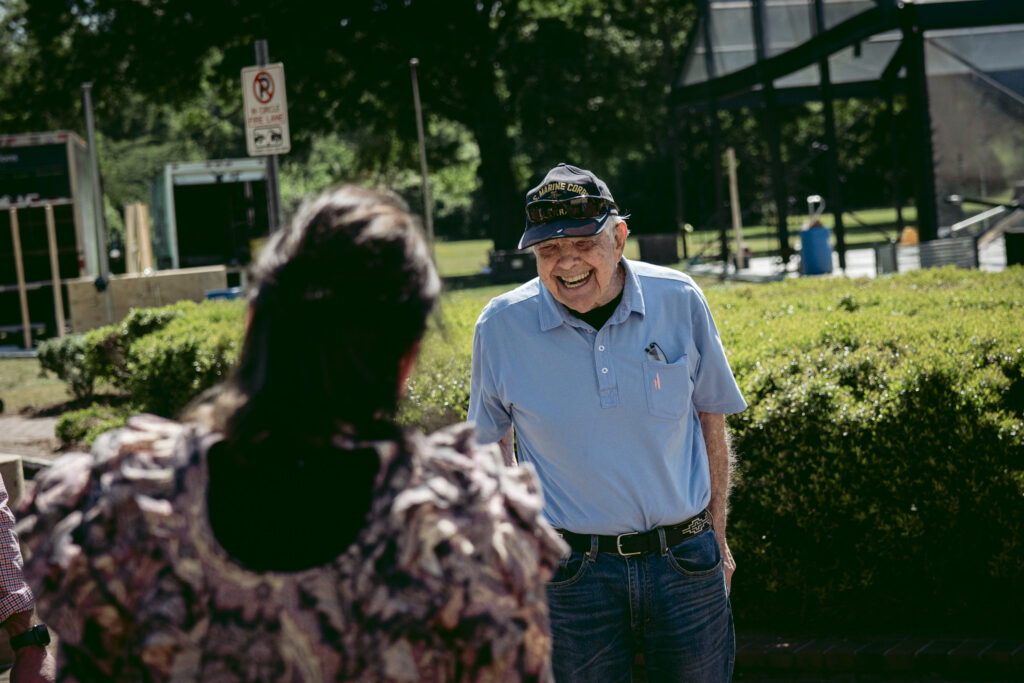
Winding back through Eastover, he tells me to stop. We pull up in front of a home on Colville Road, where he and his family moved after leaving Beverly Woods in 1968.
He entered that home as a vice president at NCNB, and left it as the CEO of NationsBank. “There’s a lot of history in it,” he says.
Jane chose all their houses, he says. When they bought this one he was in the middle of a big merger at work. He can’t remember which one, but he does remember he flew out of town to work on the deal, and when he came back, the movers had already taken everything over to their new place.
He looked around the empty rooms that night. He didn’t have his books, didn’t have his favorite chairs, and Jane wasn’t there. He realized he was no longer sentimental about leaving the house.
“You think you’re going to miss a house, but you don’t,” he says.
I jokingly asked McColl once if he really financed all the buildings and cultural institutions and transportation initiatives because he loved Charlotte, or because he wanted Jane to love Charlotte.
“Probably a little bit of both,” he said.
We drive forward, turn a corner, and pull back into his driveway.
There sits one of his prized possessions: an old, white 1993 Ford Ranger with bumper stickers all over the windows and tailgate. Some neighbors tried for years to shame him into getting rid of it. Zimmerman, the tastemaker and founder of Southern Shows, thought it added character and a unique touch to the neighborhood, but remembers the debate. One Saturday in 1999 the neighbors almost got their wish. He’d taken it to Home Depot and left his keys in it, and someone stole it.
Four days later, though, investigators spotted the truck with the bumper stickers downtown. The driver realized he was being followed by police and ditched it at the transportation center, then got lost in the crowd.
Those are the facts of the case of McColl’s stolen truck. But Zimmerman has her own theory for why he got it back.
“Even the thieves didn’t want it,” she says.

One thing McColl is not: a lingerer.
Lately he’s been considering using his birthday as a chance to “retire” from public life, to give up the panel discussions and appearances. During our ride and interview, I ask him if he’s going to follow through on that.
“I think I will,” he says. “The only reason to do that would be to get some easing off of people asking me to do things.”
“Like this?” I ask, laughing.
“Like this, yeah,” he says, not laughing. “I’m really sort of tired of doing this.”
He gets out of the passenger’s seat, stands for a few photos, and walks inside.
As I pull away I remember a moment last September. He was part of a panel discussion about economic mobility in uptown. After it was over, people crowded around him, as they usually do. I waited for a few minutes and then said hello, and suggested we catch up for lunch again soon.
He looked straight at me.
“Let’s go now,” he said. “I’ll never get out of here otherwise.”
He stepped quickly past me. “C’mon.”
I followed him out the door and down the hallway to the elevator, the guest of the hour, there and gone in a blink.
Editor’s note: I updated this to say that Joan Zimmerman thought McColl’s truck added a unique touch to the neighborhood, and that she wasn’t among those who thought it was an eyesore.
